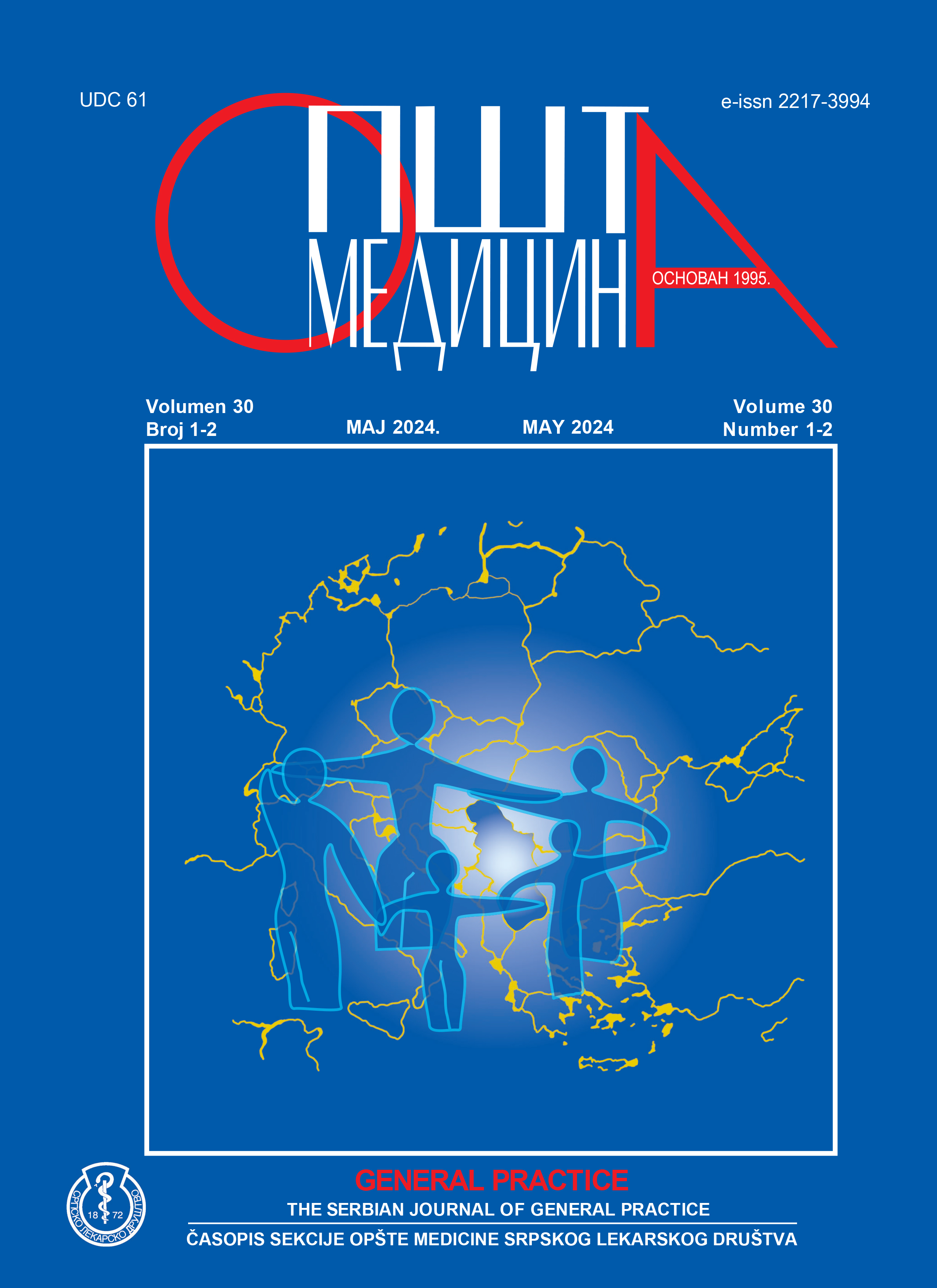Motherhood and breastfeeding after brest carcinoma
Abstract
Introduction. Breast cancer is the most prevalent cancer
in women. The most reliable method to diagnose breast
cancer is through mammography, combined with ultrasonography
or magnetic resonance imaging. The treatment plan
may include surgery, radiation therapy, chemotherapy, hormone
therapy, targeted therapy, or immunotherapy.
Case report. The following is a case report of a 46-yearold
woman who visited a physician in 2007 when she was
planning her second pregnancy. She was 30 years old at the
time. During a routine breast self-examination, she noticed
a lump and was sent for an ultrasound examination where
the tumor was confirmed. After diagnosis and preoperative
preparation, she underwent breast-preserving surgery of the
left breast, along with axilla dissection due to positive lymph
nodes. Pathohistologic findings confirmed Carcinoma mixtus
praecipue ductale G2 et partim mucinosum G2, while no
metastatic changes were found in the axillary lymph nodes.
The tumor’s hormonal status was estrogen 1, progesterone 1,
and HER2 2. The patient received six rounds of FAC chemotherapy
followed by 16 rounds of trastuzumab. After starting
on tamoxifen and using it until December 2009, she had to
undergo the removal of her right ovary due to the discovery
of numerous cysts. Several cysts were also found on the left
ovary. Five years after her breast cancer surgery, the patient
became pregnant and gave birth to a baby girl. She breastfed
her for ten months from the breast that was not operated on.
Conclusion. Breast cancer is a serious illness that can
greatly affect the reproductive health of young women. It is
essential to take into account the patient’s desire to have children
after treatment. Therefore, it is crucial to provide appropriate
therapy and counseling.
References
Miao H, Verkooijen HM, Chia KS, Bouchardy C, Pukkala E, Larønningen S, et al. Incidence and outcome of male breast cancer: an international population-based study. J Clin Oncol 2011;29(33):4381–6.
Sun YS, Zhao Z, Yang ZN, Xu F, Lu HJ, Zhu ZY, et al. Risk Factors and Preventions of Breast Cancer. Int J Biol Sci 2017;13(11):1387–97.
Filipović S, Filipović A, Stojiljković V, Mišić I, Svetislav V, Pejčić I, et al. Karcinom dojke – Kliničke implikacije. JMB 2007;26(2):134–43.
Radhakrishna S, Agarwal S, Parikh PM, Kaur K, Panwar S, Sharma S, et al. Role of magnetic resonance imaging in breast cancer management. South Asian J Cancer 2018;7(2):69–71.
Rakha EA, Ellis IO. An overview of assessment of prognostic and predictive factors in breast cancer needle core biopsy specimens. J Clin Pathol 2007;60(12):1300–6.
Senkus E, Kyriakides S, Ohno S, Penault-Llorca F, Poortmans P, Rutgers E, et al. Primary breast cancer: ESMO Clinical Practice Guidelines for diagnosis, treatment and follow-up. Ann Oncol 2015;26(suppl 5):v8–30.
Wahba HA, El-Hadaad HA. Current approaches in treatment of triple-negative breast cancer. Cancer Biol Med 2015;12(2):106–16.
Esteva FJ, Hubbard-Lucey VM, Tang J, Pusztai L. Immunotherapy and targeted therapy combinations in metastatic breast cancer. Lancet Oncol 2019;20(3):e175–e86.
Allemani C, Matsuda T, Di Carlo V, Harewood R, Matz M, Nikšić M, et al. Global surveillance of trends in cancer survival 2000-14 (CONCORD-3): analysis of individual records for 37 513 025 patients diagnosed with one of 18 cancers from 322 population-based registries in 71 countries. Lancet 2018;391(10125):1023–75.
Shah NM, Scott DM, Kandagatla P, Moravek MB, Cobain E, Burness ML, et al. Young Women with Breast Cancer: Fertility Preservation Options and Management of Pregnancy-Associated Breast Cancer. Ann Surg Oncol 2019;26(5):1214–24.
Rosenberg SM, Newman LA, Partridge AH. Breast Cancer in Young Women: Rare Disease or Public Health Problem? JAMA Oncol 2015;1(7):877–8.
Azim Jr. HA, Santoro L, Pavlidis N, Gelber S, Kroman N, Azim H, et al. Safety of pregnancy following breast cancer diagnosis: A meta-analysis of 14 studies. Eur J Cancer 2011;47(1):74–83.
Lopresti M, Rizack T, Dizon DS. Sexuality, fertility and pregnancy following breast cancer treatment. Gland Surg 2018;7(4):404–10.
Hasson SP, Brezis MR, Shachar E, Shachar SS, Wolf I, Sonnenblick A. Adjuvant endocrine therapy in HER2-positive breast cancer patients: systematic review and meta-analysis. ESMO Open 2021;6(2):100088.
Partridge AH, Niman SM, Ruggeri M, Peccatori FA, Azim Jr. HA, Colleoni M, et al. Interrupting Endocrine Therapy to Attempt Pregnancy after Breast Cancer. N Engl J Med 2023;388(18):1645–56.
Xia LY, Hu QL, Zhou Q. Use of trastuzumab in treating breast cancer during pregnancy: a systematic review and meta-analysis. BMC Womens Health 2021;21(1):169.
Bhurosy T, Niu Z, Heckman CJ. Breastfeeding is possible: a systematic review on the feasibility and challenges of breastfeeding among breast cancer survivors of reproductive age. Ann Surg Oncol 2021;28(7):3723–35.
Johnson HM, Mitchell KB. Breastfeeding and Breast Cancer: Managing Lactation in Survivors and Women with a New Diagnosis. Ann Surg Oncol 2019;26(10):3032–39.
Azim Jr HA, Bellettini G, Liptrott SJ, Armeni ME, Dell’Acqua V, Torti F, et al. Breastfeeding in breast cancer survivors: Pattern, behaviour and effect on breast cancer outcome. Breast 2010;19(6):527–31.
Copyright (c) 2024 Dragana Valent

This work is licensed under a Creative Commons Attribution-NonCommercial-ShareAlike 4.0 International License.
Autori zadržavaju autorska prava nad objavljenim člancima, a izdavaču daju neekskluzivno pravo da članak objavi, da u slučaju daljeg korišćenja članka bude naveden kao njegov prvi izdavač, kao i da distribuira članak u svim oblicima i medijima.

